#ThingsThatLeaveBritainReeling
Confirmed 12,669
Part of a series on 2017 London Attack. [View Related Entries]
#ThingsThatLeaveBritainReeling
Part of a series on 2017 London Attack. [View Related Entries]
| Navigation |
| About • Origin • Spread • Various Examples • Search Interest • External References • Recent Images |
About
#ThingsThatLeaveBritainReeling is a hashtag response to frequent reports that the country of Great Britain was "reeling" after the 2017 London Attack. The hashtag comedically sends the idea that mundane or banal things irritate the country's citizens more so than terrorism.
Origin
Following the 2017 London Attack, many media outlets, including ABC, began describing Great Britain as "reeling." In the early morning of June 4th, 2017, The New York Times tweeted "The London attacks hit a nation still reeling from the shock of the bombing in Manchester almost 2 weeks ago," along with a link to the accompanying article (shown below).[1] The tweet received more than 590 retweets and 870 likes in 24 hours.

Shortly after, Twitter user @A_V_M_L responded with a black and white picture of a woman drinking tea while sitting on a pile of rubble with the caption "This is what "reeling" means in British English @nytimes." The tweet (shown below, left) received more than 6,500 retweets and 17,400 likes in 24 hours.[5] Harry Potter author J.K. Rowling also tweeted, "The thugs who mowed down innocent people would love to think of the UK 'reeling' but it isn't. Don't confuse grief with lack of courage." Her tweet (shown below, right) received more than 23,000 retweets and 79,000 likes in 24 hours.


The first person to use the hashtag #ThingsThatLeaveBritainReeling as Twitter user @AndyGilder,[11] who on June 4th, tweeted "Putting milk first in the tea #ThingsThatLeaveBritainReeling." The post (shown below) received more than 260 retweets and 880 likes.

Spread
Once the hashtag started trending, people began sarcastically naming the everyday things that leave Britain reeling (examples below). Several news outlets covered the hashtag, including BBC,[6] HuffPo,[7] Newsweek,[9] The Washington Post[10] and more.


On June 4th, Last Week Tonight with John Oliver devoted a segment to the hashtag (shown below) and referred to coverage of citizens' response to the attacks as "insulting." Several news outlets covered Oliver's segment, including The Daily Beast,[2] Vanity Fair,[3] Entertainment Weekly[4] and more.
Various Examples






Search Interest
External References
[1] Twitter – @NYTimes' Tweet
[2] The Daily Beast – John Oliver Goes Off on the Media for ‘Insulting’ London Attack Coverage
[3] Vanity Fair – Why John Oliver Found the Media’s Coverage of London’s Terror Attacks 'Insulting'
[4] Entertainment Weekly – John Oliver calls out American media for London attack coverage
[5] Twitter – @A_V_M_L's Tweet
[6] BBC – #ThingsThatLeaveBritainReeling trends after London attack in response to headline
[7] HuffPo – London Bridge Attack Prompts People To Share ‘Things That Leave Britain Reeling’
[8] Twitter – @jk_rowling's Tweet
[9] Newsweek – Britain Reacts to the London Attack as It Knows Best -- With Sarcasm
[10] The Washington Post – London, ‘reeling’? The city that weathered Nazi bombs pushes back against fear.
[11] Twitter – @AndyGilder's Tweet
Recent Videos
There are no videos currently available.
Recent Images 12 total
Share Pin
Recent Images 12 total
Recent Videos 0 total
There are no recent videos.
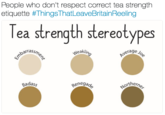
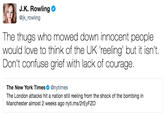
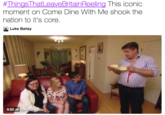

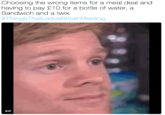
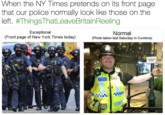
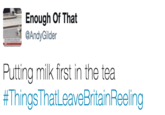
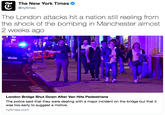

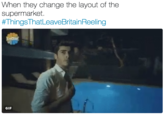
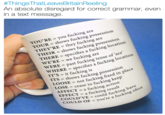
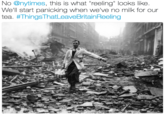

Comments ( 22 )
Sorry, but you must activate your account to post a comment.
Please check your email for your activation code.